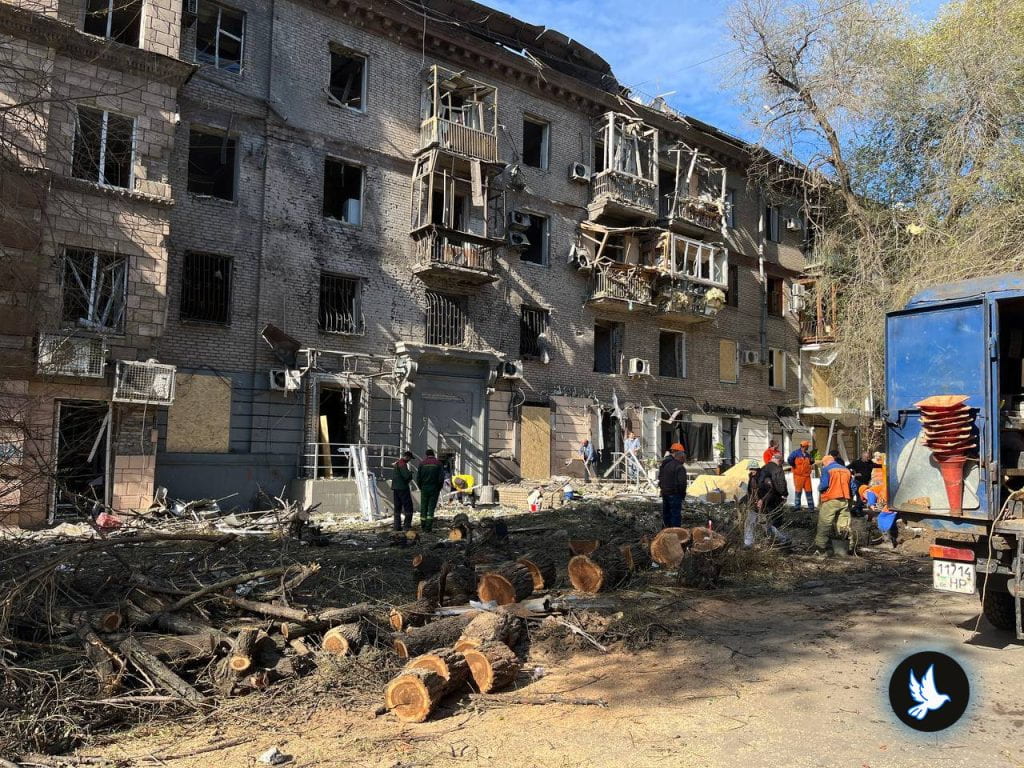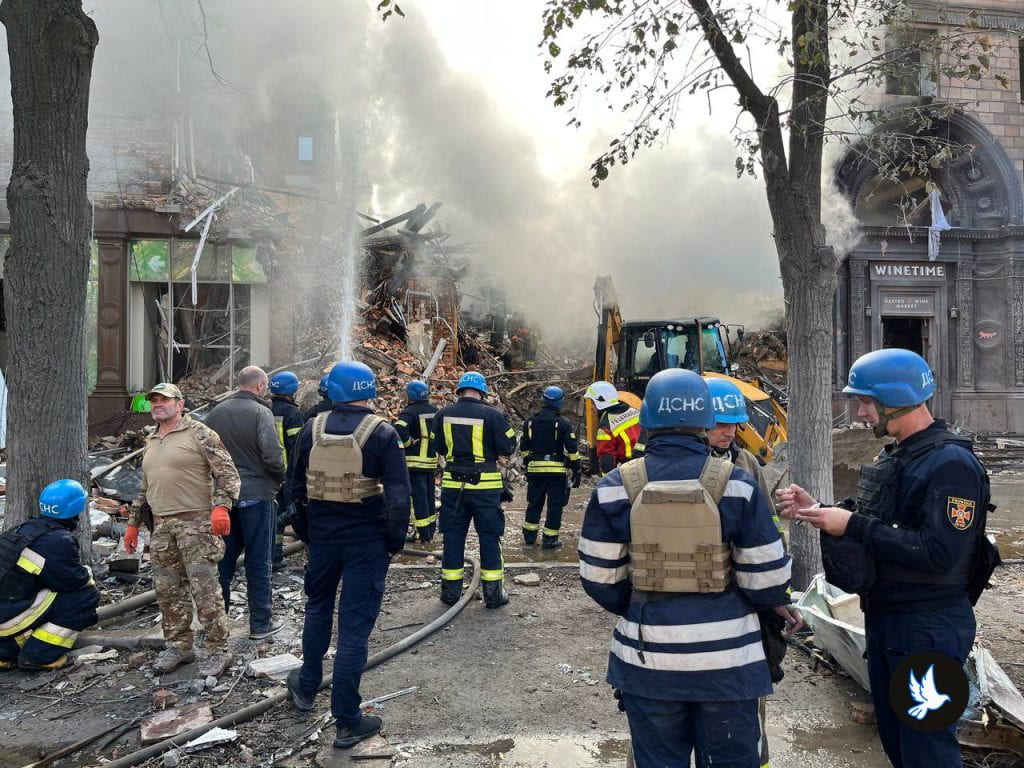This Southern center is only 30 miles away from the Russian army

“The situation changes all the time,” Anna sighs, “Sometimes, we get relatively calm days and even weeks, and sometimes, we get bombed non-stop.”
Anna prefers that I don’t use her last name. A young woman in her early thirties, she works as a project manager in Zaporizhya. Anna has a pleasant, friendly face and a melodic voice which has a calming effect: even when she talks about the horrors of the Russian invasion, I still feel like listening to her more.
Anna is from Zaporizhya, a city in Southern Ukraine that is less than one hour drive from the territory temporarily occupied by Russia. Russians are constantly shelling the region and terrorizing civilians. Throughout October, they have been launching regular attacks on Zaporizhya, killing at least 70 residents. The bombing and shelling have diminished somewhat in the last weeks although Russians have restarted their attacks after they retreated from nearby Kherson.
“We had two weeks of very intensive attacks,” Anna recalls, “Back then, we were shelled morning, day, and night. With so many victims and wounded, it was a very difficult period. It was very hard for me.”
Zaporizhya is home to nearly 800 thousand residents. However, when Russia launched its full-scale invasion against Ukraine, a quarter of the population left the city for other parts of Ukraine or went abroad. Another quarter moved to nearby villages and suburbs hoping that shellings would be less frequent there.
At the same time, Zaporizhya received an influx of internally displaced people, too; the city is hosting Ukrainians who managed to flee Russian-controlled territories and are seeking refuge close to home.
“I cannot mentally leave”
“We have heating, at least for now,” Anna tells me, “So if Russians don’t damage the critical infrastructure, we will have it in winter, too.”
A lack of heating and electricity is not uncommon after Russia destroyed nearly 40% of Ukraine’s infrastructure.
“The situation is a bit better now than before, but we can never predict how long this will last,” Anna proceeds, “When there were fewer attacks, I managed to sleep at night during the entire week. This is a big deal for me.”
When Russia was targeting Zaporizhya day and night in October, Anna could not sleep or work. She had to put her life on hold.
“At that time, it was very difficult to remain in the city,” the woman says, “During that intensive shooting period, lots of people left. Many of my friends went away. Some left for a short time because it was impossible to sleep. However, many people stayed as lots of locals have jobs here and are linked to the city. I have many friends who work here and stayed throughout everything.”
For Anna, constant October attacks were the worst.
“For me, it did not feel like weeks. It felt longer,” she recalls.
During that time, there were lots of attacks on the right bank of the city. Zaporizhya stands on the Dnipro river, which separates the city into the left and right banks.
“The right bank used to be somewhat calmer before,” Anna explains, “But in October, Russians attacked it more, so my perspective on the city and security changed. It was extremely difficult both physically and mentally for me. I could not work and I could not sleep as many attacks took place at night.”
“I think I became traumatized during that period which kept me tense all the time,” she continues, “I left the city for a few days and went to Dnipro [a nearby city in South-East – Anna Romandash]. I needed a change. While in Dnipro, I could compare and reflect, and I saw that the situation in my home city was very tense.”
Despite that, Anna returned a few days later.
“I was thinking about leaving Zaporizhya when we had those very intense shootings,” she says, “Especially because there were so many attacks on residential buildings. However, I decided to stay because my husband is at the front line. This prevents me from traveling anywhere further than Kyiv. At first, I considered going to the capital, but it was not that safe at that time anyways. For now, I am staying home, and I will see what happens later.”
“Local government lives in its own reality”
Even under these conditions, the city keeps on living.

“I see lots of people in the parks, and it feels like there are enough residents anywhere you go,” Anna proceeds, “Many people remain, especially volunteers who never left and keep on working and helping. Because the city is so close to the front line, volunteers have to be very dynamic to carry on despite everything. Some institutions are open, and some are closed. The city lives its life.”
Residents are more cautious about their safety now.
“The streets make you feel more tense when there is an air alert,” Anna explains, “In my case, I am more likely to seek shelter than a month ago, especially when I am outside.”
She is unhappy with the local authorities and how they manage the war situation. For example, in Zaporizhya, basements are open only during the air alerts which warn the residents about an upcoming Russian bombing. However, there were many occasions when the city was targeted and shelled even before the sirens turned on.
“Zaporizhya does not have a lot of well-equipped shelters, and it is difficult for a lot of people working nights to be safe under these conditions,” Anna says, “The local government did not provide a solution or show any empathy when dealing with this issue. It feels like the officials are either very incompetent or are ignoring the problems which matter for the city.”
In addition, the local government received a lot of criticism from the civil society because of the poor handling of the humanitarian aid for the residents.
“There were investigations looking into the transparency of the process, but the results have not yet been shared with the public,” Anna explains, “However, from what I see, most investigated people are still holding their official posts. This upsets me a lot, and it looks bad.”
“I feel like the government is living in its own parallel reality,” she adds, “For example, there is another case with Yalansky park in the city. A former politician from a pro-Russian party has been suing to get a permit to construct a mall there. The case was frozen for a long time, and recently, the guy won and got a permit from the city administration for the construction. This is a huge slap for the local authorities who allowed this. Locals are very disappointed and feel like the city government lives a life that is outside the real world.”
However, the state government is opening some investigations related to the city and its key figures. In late October, Ukraine’s intelligence services arrested former lawmaker Vyacheslav Bohuslayev. The man is an honorary president of “Motor Sich”, a Ukrainian aircraft engine manufacturer based in Zaporizhia. The company produces airplanes and helicopter engines; it is a strategic military enterprise.
Bohuslayev is accused of collaborating and assisting Russia and potentially providing the aggressor state with parts for its helicopters. In addition, he has Russian citizenship, which he hid as well as property in Moscow.
“This makes me happy to see that people like Bohuslayev are finally being investigated,” Anna concludes.
Anna Romandash is a Ukrainian freelance journalist and 2022 Research Affiliate at the Mgrublian Center for Human Rights at Claremont McKenna College
